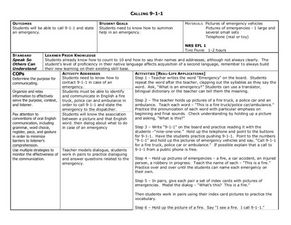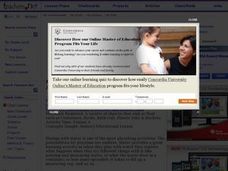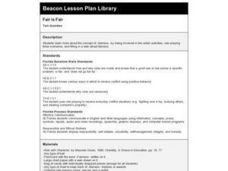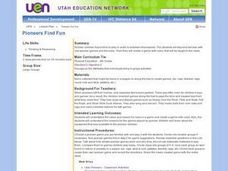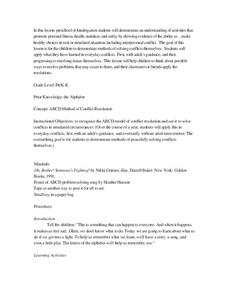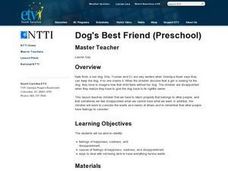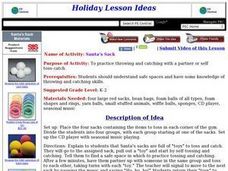Curated OER
Calling 9-1-1
Students analyze emergencies. In this safety lesson, students discover when and why they should dial 9-1-1. They discuss as a group various scenarios in which they would need to call 9-1-1 and then role-play those situations. This lesson...
PBS
Using Primary Sources: Nazi Spy Ring Busted
Spy games are not just for professionals anymore! Scholars use short video clips, primary documents, and photographs to investigate Nazi spies in America during World War II. The young detectives analyze the paranoia warfare can create...
Curated OER
Ball and Triangle Game
Young scholars view and discuss pictures of the Ball and Triangle Game the Penobscot Indian students in New England played. They construct cardboard versions of the game, and practice the game and keep score using beans.
Curated OER
Energy Transformation with a Top
Second graders examine both potential and kinetic energy. After discussing the difference and examples of potential and kinetic energy, they participate in a game of "Show Me Potential Energy/Show Me Kinetic Energy" using toy tops.
Curated OER
Energy Transformation with Simple Machines
First graders identify both potential and kinetic energy in a game they play in the classroom. They listen as the teacher explains the difference between potential and kinetic energy when observing a simple machine. Using simple...
Curated OER
Newton's Universal Law of Gravitation with Simple Machines
First graders engage in a lesson that is about Newton's Laws Of Gravitation while conducting research in order to perform an information search. They sing a song about the Law of Gravitation and play a game of Ring Around The Rosie. Then...
Curated OER
Sink or Float Water Play Activity
Students experiment with different objects to see if they sink or float. They can also choose certain colored items if more review is necessary.
Curated OER
Fair is Fair
Students participate in two unfair activities to explain the concept of fairness. Then they role-play different scenarios demonstrating the idea of fairness. They discuss reasons to make rules and complete a web chart on fairness.
Curated OER
Traveler's in Time
Students analyze artifacts to become familiar with the Great Migration. In this migration lesson, students read an article and answer comprehension questions. Students role play a migration scenario using an artifact to help describe...
Curated OER
Physical Science: Bubble Prints
Students participate in a lab experiment involving soap bubbles and making bubble prints. They blow bubbles into the soap and add paint to make bubble prints. With extra time, they can play with a variety of bubble toys to see what...
Curated OER
Fair Games
Students participate in several chance activities and examine a few games for fairness. They become game designers who are asked to design a fair game for a toy company. Students must describe the rules for play and examine...
Curated OER
Rules and Consequences in the Classroom
Learners study rules and consequences as well as learn positive, healthy behaviors in and out of the classroom. In this behavior lesson, students discuss behaviors that got them into trouble at home. Learners name trouble behaviors at...
Curated OER
School Manners and Student Behavior
Students write rules for good manners. In this character building lesson, students discuss and record showing respect in the classroom, playground, and cafeteria. They role play these behaviors in front of the class.
Curated OER
Pioneers Find Fun
Fourth graders investigate pioneer Studentss games. They research various games, play a pioneer game, and in small groups, create their own original pioneer game to teach to the class.
Curated OER
Sports Activity Stations
Fourth graders observe and understand forces applied to an object and the change in speed or direction of the object. In this forces lesson, 4th graders divide into groups and play at various sports stations. Students mark push or pull...
Curated OER
Can You Do This?
Third graders write paragraphs describing activities for classmates to perform using toys such as balls, jump ropes or hula hoops. They take turns reading their paragraphs while other students follow the directions.
Curated OER
Canine Companions: Good or Bad? Proper Treatment of Dogs
Students explore the concept of proper canine treatment. In this social skills lesson, students decide if the teacher's statement about treatment of dogs is good or bad. Students then play games to show their new knowledge of the...
Curated OER
Outdoor Activities: Solve It-Outdoors
Students practice problem solving skills. In this early childhood education lesson, students foster the ability to use creative and critical thinking to turn obstacles into bridges to greater learning as they complete various activities...
Curated OER
Halloween Stations
Students rotate through 8 stations, each with a Halloween theme. The stations help develop the following skills: rolling a ball, throwing overhand and underhand, eye-hand coordination, and muscle strength.
Curated OER
Ghostbusters
Students pretend that they are all ghosts. They must ride on their gluts on their scooter. They then pick 2-4 taggers, also known as ghostbusters. They also ride on their gluts but hold a "tagging wand". When students get tagged they...
Curated OER
Which Has The Most?
Young scholars are part of a class poll where they choose their favorite food and their favorite toy. In this which has the most lesson, students are given a block to represent their choice. Young scholars then place the block by the...
Curated OER
Conflict Resolution
Young scholars demonstrate conflict resolution skills. In this character education lesson, students read the book Oh, Bother! Someone's Fighting! and sing a song which models a conflict resolution strategy.
Curated OER
Dog's Best Friend
Students learn about and identify feelings of happiness, sadness and disappointment. In this feelings lesson, students have a show and tell time about their pets and discuss how it would feel if they lost their pet. Students watch a...
Curated OER
Santa's Sack
Students practice throwing and catching with a partner or self toss-catch. As a prerequisite skill they should understand safe spaces and have some knowledge of throwing and catching skills.


